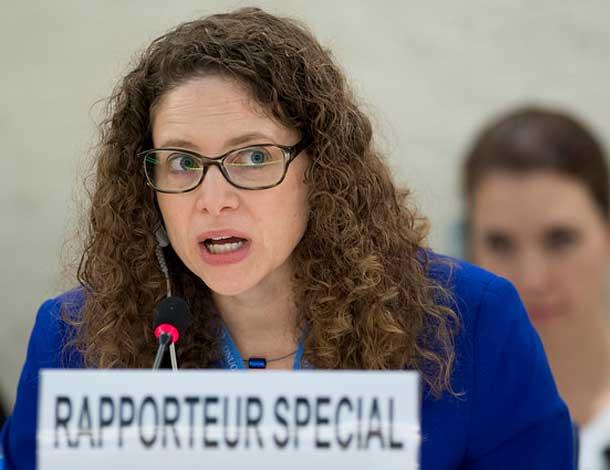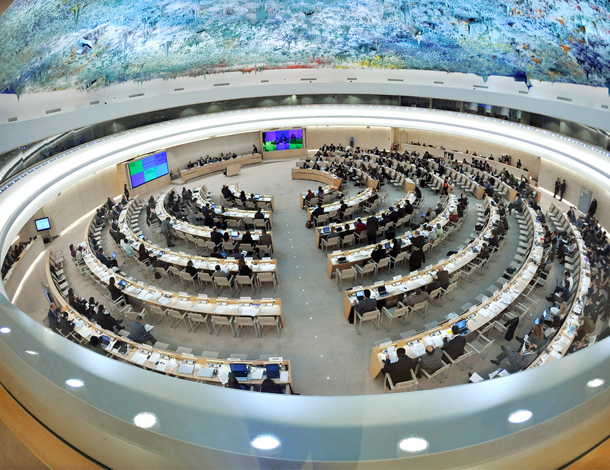In her second report to the Human Rights Council (34th session, March 2017), Special Rapporteur in the field of cultural rights Karima Bennoune considers how the rise of fundamentalism and extremism represent major threats to human rights worldwide, and calls for a global rights-based response.
Defining fundamentalisms, defining cultural rights
At a time of rising fundamentalisms and extremisms of all stripes, the Special Rapporteur’s report, replete with case studies from around the globe, serves as an important reminder that fundamentalisms are not the preserve of one religion or region. Furthermore, the report reiterates that different fundamentalist movements often reinforce each other through “reciprocal radicalization.”
The Special Rapporteur defines fundamentalism and extremism as ideologies with diverse manifestations but carrying common themes regarding their abuse of cultural rights:
-
Attempts at cultural engineering aimed at redesigning culture based on monolithic world views
-
Focus on “purity” and enmity toward “the other”
-
Policing of “honour” and “modesty”
-
Claims of cultural and moral superiority
-
Imposition of a claimed “true religion” or “authentic culture” along with dress and behaviour codes often alien to the lived cultures of local populations
-
Stifling freedom of artistic expression and curtailing scientific freedom.
-
Attempts to limit the enjoyment of women’s human rights and restrict the sexual and reproductive rights of all
-
Attempts to quash cultural opposition to their own agenda.
The report serves as a reminder, not only of what cultural rights are, but also what they are not.
Cultural Rights, [are] the rights for each person, as well as groups, to develop and express their humanity, their world view and the meanings they give to their existence and their development through, inter alia, values, beliefs, languages, knowledge and the arts, and ways of life... Article 2 (2) of [the International Covenant on Economic, Social and Cultural Rights] prohibits discrimination with regard to these rights, while article 3 states that men and women are equally entitled to the enjoyment of economic, social and cultural rights.
Paragraph 43
Cultural rights should never be accepted as an excuse for the violation of other human rights, nor considered a justification for discrimination or violence.
[Cultural rights] are not a licence to impose identities or practices on others or to exclude them from either in violation of international law. They are firmly embedded in the universal human rights framework. Hence, the implementation of human rights must take into consideration respect for cultural rights, even as cultural rights themselves must take into consideration respect for other universal human rights norms.
Paragraph 46
The report goes on to identify the universality of human rights as one of the most important tools in the struggle against fundamentalisms, naming cultural relativism as a concept which aids and abets extremism. (As expressed in article 4 of the UNESCO Universal Declaration on Cultural Diversity, no one may invoke cultural diversity to infringe upon human rights guaranteed by international law, nor to limit their scope.)
Fundamentalisms and intersecting axes of oppression

The report outlines the various ways fundamentalisms violate cultural rights, including through: censorship, education that does not conform to human rights standards, blasphemy laws, discriminatory family laws, human rights abuses motivated by fundamentalist and extremist ideology, violence and harassment towards artists, intellectuals, and cultural rights defenders.
Of particular interest are explorations on the gendered nature of the assault on cultural rights, including: the denial of women’s equal participation in culture; the targeting of Women Human RIghts Defenders (WHRDs); resistance to inter-marriage; enforced gender segregation; and denial of equal rights to worship.
Given that the gendered aspects of fundamentalisms are often either ignored, or otherwise instrumentalized, Bennoune’s framing of women’s rights and substantive equality as an essential component of the fight against fundamentalisms is extremely welcome. As WHRD from Niger Zeinabou Hadari is quoted as saying: “Every step forward in the fight for women’s rights is a piece of the struggle against fundamentalism.”
The report also notes the intersections between fundamentalisms and extremisms and the oppression of persons based on their sexual orientation and gender identity and expression. It details examples of the silencing of LGBT themes within cultural production; the export of anti-LGBT agendas from North America to global South locations, in particular African countries; and the role of religious institutions in sanctioning violence against people who do not adhere to hetero-patriarchal norms.
The report also explores the way fundamentalists contribute to discrimination and violence against people on the basis of their race, ethnicity, and national origin. In particular, the Special Rapporteur remarks upon the alarming rise in far-right white supremacist and nationalist groups in Europe and North America, and widespread anti-immigration discourse.
Given that the threat of religious fundamentalisms, and their gendered nature in particular, are widely co-opted in the service of other oppressive agendas - with Muslim fundamentalisms in particular serving as a central theme in the support of racist and anti-immigration agendas - the report’s discussion of white nationalism as another form of extremism could not be more necessary.
Bennoune’s call for governments to grant asylum to those fleeing fundamentalist persecution, including persecution based on gender and sexuality, serves as a stark reminder of the hypocrisy of European governments who make pronouncements about violations committed in the name of religion while all the while closing the borders to those who seek refuge.
A transnational rights-based response
“The international community must stand together. This is a wake-up call for our times. We face a multidirectional global avalanche of hate to which we must have an urgent global riposte. We must build and rebuild the culture of human rights and basic decency everywhere through effective, thoughtful, international law-abiding global action, within a universal human rights framework.”
Karima Bennoune

The report is a call to action for fundamentalisms to be framed as a human rights issue, and with specific implications for the rights of women, LGBT persons, and religious and ethnic minorities. Bennoune calls on states to make a gendered approach central to challenging fundamentalisms, and to advocate for policies that oppose discrimination in the right to take part in cultural life.
The report recognizes the increased threats faced by WHRDs and calls for states to ensure their rights and safety. Furthermore, it recognises the expertise of these defenders, calling for their inclusion in international policymaking on issues of fundamentalisms.
The Special Rapporteur calls for states to denounce fundamentalist ideology wholesale, cautioning against becoming bedfellows with so-called “non-violent” extremists, backing up what feminists have highlighted for decades - that masculinist, public-sphere based definitions of violence obscure many forms of violence committed by fundamentalists towards women, and those who do not conform to norms of gender and sexual orientation.
Bennoune calls for states to address the root causes of fundamentalisms through education, socio-economic measures, political reform, and for states to perform due diligence to protect citizens from violations by fundamentalist non-state actors.
The report stresses that all responses to fundamentalisms must be founded on the principles of human rights, offering an important caution against any uses of fundamentalism or extremism as an excuse to quash dissent or restrict civil society space. This intervention is extremely important given the proliferation of cases in which fundamentalisms are used as an excuse for restricting freedoms, such as anti-terrorism laws in countries across the world, including Egypt, the United Kingdom, the United States of America, and many ex-Soviet countries, to name just some.
In the ongoing reality of using tragedies for political point-scoring, the report re-emphasizes the global equality of victims of terrorism. Bennoune’s interventions serve as a rebuttal to dangerous notions of a “clash of cultures” - she reframes the problem of fundamentalism as a global struggle between those who want rights, justice, freedoms, and cultural diversity and those who seek discrimination, oppression, and imposition of a monolithic worldview. Bennoune’s central message is a rallying call to come together around the universality of rights in order to stop “the avalanche of hate” that we currently face.
